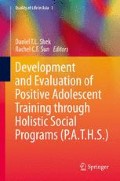Abstract
Using personal construct psychology as the framework, 104 program participants were randomly selected to complete a repertory grid test, where personal constructs for different role figures including different selves before and after joining the Project P.A.T.H.S. were elicited from the informants. Quantitative and qualitative data based on elicited constructs surrounding self-identity changes after joining the program were examined. Quantitative and qualitative findings showed that participants identified themselves with their “ideal self,” “a successful person,” and “a mature peer” more after the program. At the same time, they perceived that they were more distant from “a loser” after joining the program. Compared with the self before joining the program, the self after joining the program was closer to the positive role figures. Six exemplar grids showing the positive changes in the program participants after joining the program are shown. The present study underscores the utility of the repertory grid technique in positive youth development programs.
The preparation for this chapter and the Project P.A.T.H.S. were financially supported by The Hong Kong Jockey Club Charities Trust. Address all correspondence to Daniel T.L. Shek, Department of Applied Social Sciences, The Hong Kong Polytechnic University, Hunghom, Hong Kong (e-mail address: daniel.shek@polyu.edu.hk).
Access this chapter
Tax calculation will be finalised at checkout
Purchases are for personal use only
References
Bell, R. C. (2003). The repertory grid technique. In F. Fransella (Ed.), International handbook of personal construct psychology (pp. 95–103). West Sussex, UK: Wiley.
Böker, H., Hell, D., Budischewski, K., Eppel, A., Härtling, F., Rinnert, H., et al. (2000). Personality and object relations in patients with affective disorders: Idiographic research by means of the repertory grid technique. Journal of Affective Disorders, 60(1), 53–59.
Borell, K., Espwall, M., Pryce, J., & Brenner, S. O. (2003). The repertory grid technique in social work research, practice and education. Qualitative Social Work: Research Practice, 2(4), 477–491.
Castejón, J. L., & Martínez, M. A. (2001). The personal constructs of expert and novice teachers concerning the teacher function in the Spanish educational reform. Learning and Instruction, 11(2), 113–131.
Cornelius, N. (2003). The struggles of organizational transitions. In F. Fransella (Ed.), International handbook of construct psychology (pp. 349–357). West Sussex, UK: Wiley.
Feixas, G., Montebruno, C., Dada, G., del Castillo, M., & Compañ, V. (2010). Self construction, cognitive conflicts and polarization in bulimia nervosa. International Journal of Clinical and Health Psychology, 10(3), 445–457.
Fournier, V., & Payne, R. (1994). Change in self construction during the transition from university to employment: A personal construct psychology approach. Journal of Occupational and Organizational Psychology, 67, 297–314.
Green, B. (2004). Personal construct psychology and content analysis. Personal Construct Theory & Practice, 1(3), 82–91.
Kelly, G. A. (1955). The psychology of personal constructs. New York: Norton (Republished by Routledge 1991).
König, C. J., Jöri, E., & Knüsel, P. (2011). The amazing diversity of thought: A qualitative study on how human resource practitioners perceive selection procedures. Journal of Business and Psychology, 26(4), 437–452.
Leach, C., Freshwater, K., Aldridge, J., & Sunderland, J. (2001). Analysis of repertory grids in clinical practice. British Journal of Clinical Psychology, 40(3), 225–248.
Lõpez, P., & Gallifa, J. (2008). Improving cognitive complexity via seminar methodology in higher education. Higher Education in Europe, 33(4), 471–482.
Luk, A. L., & Shek, D. T. L. (2006). Perceived personal changes in Chinese ex-mental patients attending a holistic psychiatric rehabilitation program. Social Behavior and Personality, 34(8), 939–954.
Norris, H., & Makhlouf-Norris, F. (1976). The measurement of self-identity. In P. Slater (Ed.), Explorations of intrapersonal space (pp. 79–82). Chichester, UK: Wiley.
Oosterwegel, A., Littleton, K., & Light, P. (2004). Understanding computer-related attitudes through an idiographic analysis of gender- and self-representations. Learning and Instruction, 14(2), 215–233.
Pike, S. D. (2011). Destination positioning opportunities using personal values: Elicited through the repertory test with laddering analysis. Tourism Management, 33(1), 100–107.
Salmon, D. (1993). Anticipating the school consultant role: Changes in personal constructs following training. School Psychology Quarterly, 8(4), 301–317.
Salmon, D., & Fenning, P. (1993). A process of mentorship in school consultation. Journal of Educational and Psychological Consultation, 4(1), 69–87.
Shek, D. T. L. (2012a). Evaluation of a positive youth development program based on the repertory grid test. The Scientific World Journal, 2012, 12p. Advance online publication. doi: 10.1100/2012/372752.
Shek, D. T. L. (2012b). Personal construction of cough medicine among young substance abusers in Hong Kong. The Scientific World Journal, 2012, 14p. Advance online publication. doi: 10.1100/2012/754362.
Shek, D. T. L., & Lam, C. W. (2011). Evaluation of a preventive drug program in Hong Kong using the repertory grid method. International Journal of Child Health and Human Development, 4(4), 421–432.
Slater, P. (1977). The measurement of interpersonal space by grid technique (Vol. 2). Chichester, UK: Wiley.
Stanley, B. (1985). Alienation in young offenders. In N. Beail (Ed.), Repertory grid technique and personal constructs: Applications in clinical and educational settings (pp. 47–60). London, UK: Croom Helm.
Truneckova, D., & Viney, L. L. (2007). Evaluating personal construct group work with troubled adolescents. Journal of Counseling and Development, 85(4), 450–460.
Walker, B. M., & Winter, D. A. (2007). The elaboration of personal construct psychology. Annual Review of Psychology, 58, 453–477.
Winter, D., Sireling, L., Riley, T., Metcalf, C., Quaite, A., & Bhandari, S. (2007). A controlled trial of personal construct psychotherapy for deliberate self-harm. Psychology and Psychotherapy: Theory, Research and Practice, 80(1), 23–27.
Author information
Authors and Affiliations
Corresponding author
Editor information
Editors and Affiliations
Rights and permissions
Copyright information
© 2013 Springer Science+Business Media Singapore
About this chapter
Cite this chapter
Shek, D.T.L. (2013). Evaluation Based on Personal Construct Psychology: Findings Based on the Repertory Grid Test. In: SHEK, D., Sun, R. (eds) Development and Evaluation of Positive Adolescent Training through Holistic Social Programs (P.A.T.H.S.). Quality of Life in Asia, vol 3. Springer, Singapore. https://doi.org/10.1007/978-981-4451-54-3_14
Download citation
DOI: https://doi.org/10.1007/978-981-4451-54-3_14
Published:
Publisher Name: Springer, Singapore
Print ISBN: 978-981-4451-53-6
Online ISBN: 978-981-4451-54-3
eBook Packages: Behavioral ScienceBehavioral Science and Psychology (R0)

